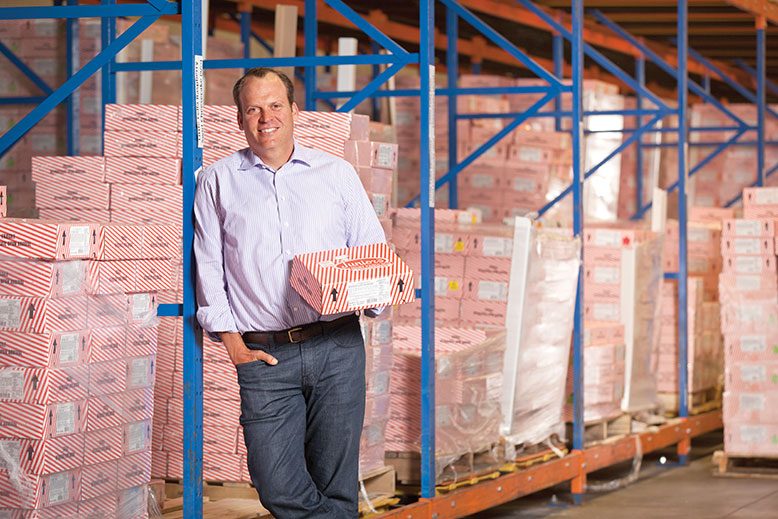
When Harry Rosen opened Junior’s restaurant on Flatbush Avenue in Brooklyn in 1950, he knew one thing. “If you wanted to be a great restaurant in New York,” says his grandson, Alan Rosen, “you had to have a great cheesecake.” Harry and his German baker, Eigil Peterson, tasted the city’s leading cheesecakes, from Lindy’s to the Brass Rail, then created their own—a denser, less sweet cheesecake that put Junior’s on the map.
Junior’s cheesecake is still on the map—but not where Harry, who died in 1996 at age 92, left it. This summer, Rosen and his older brother, Kevin, who co-own the business, moved the baking operation roughly 80 miles southwest to Burlington in South Jersey.
Much as crossing the Hudson would have startled Harry, he might have been more astonished that Rosen says he expects to sell 2 million cheesecakes this year, double the number sold last year, when the cakes were baked in a cramped facility in Queens. (The cakes served in the flagship restaurant on Flatbush Avenue are still baked on premises.)
The expanded output—which also includes quantities of layer cakes and other baked goods—is made possible by the 103,000-square-foot baking plant the company took over and refitted near the Delaware River.
Most amazing is that the 7-acre facility—with three buildings, seven loading docks and 14 ovens (five of which have yet to come on line)—will not even be operating at full capacity. For 2016, Rosen says he expects to easily exceed 2 million cheesecakes.
Who knew there was so much demand for cheesecake?
Rosen, 46, has spent much of his life building that demand. Like his brother, he grew up in the original Brooklyn restaurant. His first job was wiping counters and setting out paper doilies on which to display cheesecakes, danishes and other baked goods. After graduating from Cornell’s School of Hotel Administration, he joined the family firm full-time. During his life, Junior’s has expanded from one restaurant to four and created a large mail-order business that ships cheesecakes around the country and the globe to locations as far-flung as Dubai and Japan.
In 1995, Junior’s signed a contract with QVC to sell its baked goods over the cable shopping network. Rosen appears on camera on QVC about 50 times a year, selling a total of 150,000 or more cakes, mostly cheesecakes. One of the benefits of the Jersey move for Rosen, who lives with his wife in Great Neck, New York, is that the new facility is just an hour’s drive from QVC’s studio in West Chester, Pennsylvania. Rosen turned an office in the new plant into a bedroom for days when he has to work late or drive to QVC.
Rosen began shopping for a larger facility in 2012. He considered Carlstadt, but didn’t find exactly what he needed until last year, when Mother’s Kitchen, which bakes cheesecakes for Buffalo-based Rich Products Corporation, moved from Burlington to Texas. Out-of-state corporations often seek tax abatements or other incentives to relocate to New Jersey, but not Junior’s.
“We didn’t even ask,” he says. “This facility presented itself, and we jumped at the opportunity. I just wanted to get it done.”
About 20 people who worked in the old bakery in Maspeth, Queens, moved to Burlington, where Junior’s hired about 65 local workers to bring the staff to about 85.
The cheesecakes are baked the same way as ever. Apart from chocolate swirl, strawberry, or other embellishments, the only ingredients in the classic version (still the best seller) are Philadelphia brand cream cheese (about 40,000 pounds per week), heavy cream, eggs, vanilla and sugar. The ingredients are mixed in motorized vats that are gentle giants—able to blend the makings without adding air, so the cake comes out uniformly dense. The batter is pumped into springform pans placed on large, shallow trays filled with an inch of water. The water bath, as it’s called, creates humidity for even baking without scorching.
Each oven has nine rotating tiers holding 50 cheesecakes each. During the hour or more of baking, a worker checks the color. “Some people think cheesecakes should be white like a sheet of paper,” Rosen says. “I think they should be golden brown, like something that was actually baked in an oven.”
Afterwards, each oven’s 450 cakes cool for two to three hours before being boxed and frozen for shipment. The big question for fans is, how do Burlington cheesecakes compare with those from Queens and the Flatbush Avenue second floor?
“If anything,” says Rosen, “the quality of our cakes is better.” With nine ovens on line, “the cold batter goes directly into the oven and doesn’t have to wait and get a skin on top.”
Ever vigilant, Rosen likes to quote his father, Walter, who no doubt heard the same cautionary advice from his father, Harry: “It takes years to earn a reputation and only moments to lose it.”
